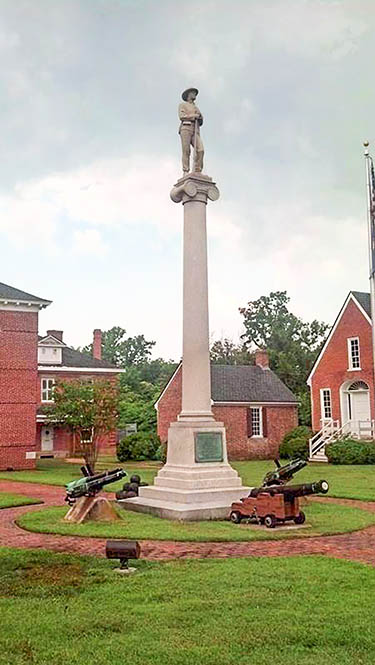By Stefanie Jackson – Across the U.S., recent protests against racism and social injustice have turned violent, leading to an array of destruction including defacing and toppling historic statues and monuments.
In light of those events, attention has turned to the Eastern Shore’s two Confederate monuments – one in Parksley, in Accomack County, and another in Eastville, Northampton’s county seat.
Confederate veterans from the Harmanson-West camp on the Eastern Shore raised the money for the Parksley monument, unveiled in 1899. They also contributed to the Eastville monument that was raised in 1913.
Jay Ford, of Belle Haven, began a fundraiser that exceeded its goal of $10,000 to purchase the Parksley monument and the land on which it stands, a small park on Cassatt Avenue, part of Route 316.
He was going to make the $10,000 offer to counter a potential deal involving the Town of Parksley selling the monument and land to the Sons of Confederate Veterans for $1.
Ford did not intend to purchase the property to destroy the Confederate monument but to build a new monument dedicated to the Eastern Shore’s historic Black community, to reclaim the space and make it inclusive, he said.
However, Parksley’s town attorney determined the monument was not the town’s to sell, and the public hearing on the monument’s sale was canceled as of Monday.
The money will now be donated to nonprofits such as the Thurgood Marshall College Fund for students attending historically black colleges and universities, a decision that won the approval of one of Ford’s friends, Bill Payne, of Cape Charles.
Payne is advocating for Northampton supervisors to take action regarding the Confederate monument in Eastville, which stands on the historic courthouse green, facing Courthouse Road.
Payne began emailing supervisors on June 12, but a month passed and he did not receive a response.
After a chance meeting with Supervisor John Coker, Payne resent his email and received a reply from Coker with assurance that the board would take up the matter.
After another month had passed, Coker indicated to Payne that Chairman Oliver Bennett seemed uninterested in addressing the issue of the Confederate monument.
Payne attributed the chairman’s inaction to a lack of “strong leadership.”
Northampton supervisors have not publicly discussed the Confederate monument at any of the four meetings they have held since June 12.
Payne said he understands that supervisors “have a lot on their plate” as the COVID-19 pandemic continues, but he would like the Confederate monument issue placed on an upcoming meeting agenda for discussion.
Payne planned to follow up with each supervisor by phone this week.
“I’m not sure what the answer is, and I’m not going to suggest to them what the answer is” regarding the monument’s future, he said.
Protesting the monument through marches or other demonstrations should only be done as a “last resort,” Payne said.
He’s not afraid to march but prefers to work with supervisors directly. When “you’re trying to get the community to rise up … you invite people and organizations who aren’t necessarily your ally,” he said.
The Eastern Shore Diverse Coalition of Preachers led a peaceful protest against systemic racism in Eastville June 27, in which participants marched down Courthouse Road with barely a glance toward the Confederate monument, but Payne is unwilling to risk organizing a protest that could have a bitter outcome.
The 78-year-old, retired business and marketing specialist said he has seen protests from both sides of the fence.
As a boy growing up in Chicago, he marched to protest the death of Emmett Till, a 14-year-old African American who was lynched in Mississippi in 1955 after allegedly offending a White woman in her family’s grocery store.
As a U.S. Army officer, Payne marched in Washington, D.C., in the 1960s, to protest the Vietnam War.
Then, as a member of the National Guard from Chicago, in 1966, he marched with Martin Luther King Jr., “but in uniform, protecting him.”
Payne sees Eastville’s Confederate monument as a “nonpolitical issue” that should concern all people, regardless of their social or economic views.
He wants the board to come to its own decision on the Confederate monument, but he would prefer it moved “where it isn’t a day-to-day reminder of some of the darker days of our history” every time someone walks down the street.
If he does not hear an “enthusiastic” response from supervisors this week, he plans to address the board at an upcoming meeting at the county administration building in Eastville, which overlooks the courthouse green and Confederate monument.
Payne’s next opportunity to make a public comment will be at the next Northampton supervisors regular meeting, Tuesday, Aug. 11, 6 p.m.



